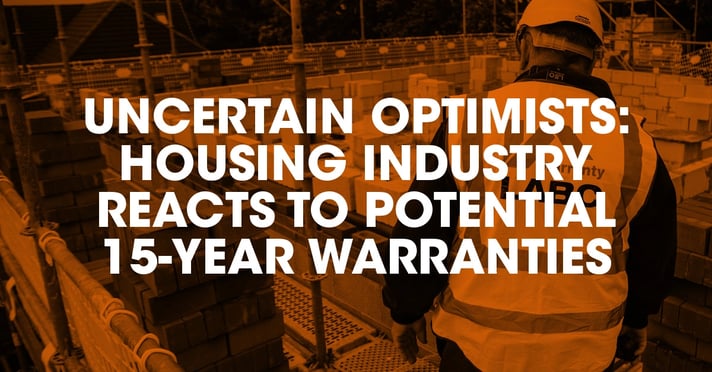A cautious optimism – structural warranty customers react to minimum 15-year warranties
An LABC Warranty survey has found that while the majority of those in the housing industry are unaware of the potential for minimum 15-year structural warranties to be introduced by law, they’re optimistic about the effects of that change.
In addition, being mostly aware of the potential introduction of mandatory structural warranties for all new-builds, they were optimistic about the effects of this change as well.
However, they expressed some serious reservations about how the changes would impact costs in an already-strained housing sector for both builders and homebuyers.
Read on for more details on the results of this survey, and some of LABC Warranty’s conclusions.
Background and method
The Building Safety Act, introduced April 2022, brings generational change to the UK's construction industry. The Act introduces new regulations, enforcement mechanisms, regulatory bodies, and enhanced powers for these regulators.
Significantly, it also includes provisions that will make structural warranties legally mandatory for the first time.
The survey focused on two aspects of the proposed legislation:
- Minimum 15-year warranties. The legislation, if triggered by secondary regulations, would establish a new standard of 15-year minimum coverage for structural warranties. Currently, most warranties span 10 years, with certain exceptions.
- All new-home coverage. The new legislation, if activated, would also make it mandatory for all new-build homes to be covered by a structural warranty. Presently, no statutory requirement mandates warranty coverage for new build homes.
LABC Warranty’s survey set out to discover the awareness level for the above legislative changes, and the level of support those changes have among existing structural warranty customers and readers of their technical content.
Gathering 270 responses from their audience of homebuilders, developers, social housing providers, contractors, self-builders and more, the survey indicated that while the sector was largely unaware of the possibility of minimum 15-year structural warranties, they were cautiously optimistic about their introduction.
LABC Warranty’s survey results at a glance
Awareness of the upcoming changes
A significant majority of respondents, 64%, were unaware of the possibility of minimum 15-year structural warranties.
On the other hand, a slimmer majority of respondents, 53%, were aware that the upcoming legislative change would introduce mandatory structural warranties on all homes regardless of whether they’re built to be sold with or without a mortgage.
Support for longer warranties
Despite the majority of respondents not knowing about the possible upcoming changes, a majority of respondents, 60%, were in support of extending minimum warranty periods.
The most commonly cited reasons for supporting the change were a belief that the extension would improve standards in homebuilding (46%), and offer better protection for homebuilders (41%).
A majority of respondents, 59%, also indicated that they believed longer warranties would improve the confidence that residents have in the quality of their new-build homes.
Of those polled, 40% believed the net outcome for the housing sector would be positive, compared to 22% saying it would be negative, and 37% predicting mixed outcomes.
Support for mandatory new-home warranties
When asked how they believed mandatory new-home warranties on all new units would affect standards and security of new homes, a majority of respondents, roughly 58%, indicated they believed there would be a net-positive outcome, compared to 35% predicting a net negative outcome.
24% of respondents believe that all new-build homes enjoying warranty would improve standards, and 26% believed it would improve standards and resident satisfaction in their homes.
This is in contrast to 3.7% of respondents saying there would be no benefit to resident confidence, and 17% of respondents believing there would be no outcome for standards, and a further 14.8% of respondents believing there would be no positive outcomes for standards or security.
Overall, a plurality of respondents, 40%, believed there would be a net positive outcome for mandatory warranties on all new-build homes. 22% indicated they believed it would be a strictly negative outcome, and 37% believed there would be a mix of negative and positive outcomes.
Conclusions at a glance
While a majority of respondents were unaware of the possibility of minimum 15-year structural warranties, and only a slim majority were aware of the possibility of mandatory structural warranties on all new homes, responses indicate a cautious optimism about the outcome of these changes.
In particular, the positive aspects focus on how the changes could increase the standards of new homes, as warranty providers seek to minimise their own exposure to risk by demanding greater up-front building standards. We should stress that this is the opinion and concern of some respondents, not a strategy any warranty provider has declared in public.
However, this cautious optimism some concerns, about how these new changes could affect costs in a sector already struggling with inflation, labour shortages, economic uncertainty, and other issues.
Further reading on this survey
A longer version of this survey goes into greater detail on the background, audience, methodology and results of this research. The longer version also features more of the anecdotal feedback from respondents, and an analysis of how different types of businesses responded to the questions.



Have your say